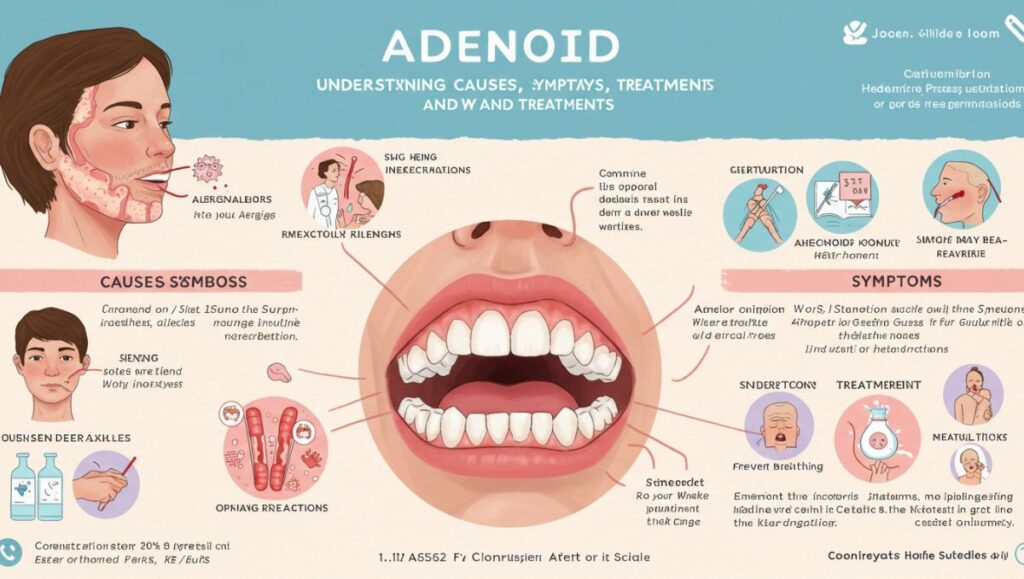Adenoidid, more commonly known as adenoiditis, is the inflammation or infection of the adenoids. Adenoids are small lymphoid tissues located at the back of the nasal passage, playing an important role in the immune system during childhood. When they become swollen or infected, it can lead to breathing difficulties, ear problems, and recurrent infections. Understanding this condition helps parents, caregivers, and patients manage it effectively.
What Are Adenoids?
Adenoids are part of the body’s lymphatic system, similar to tonsils. They help fight infections by trapping bacteria and viruses that enter through the nose. In children, adenoids are most active, but they tend to shrink naturally during adolescence and adulthood.
However, when adenoids themselves become inflamed, the condition is referred to as Adenoidid (Adenoiditis).
Causes of Adenoidid
Several factors can trigger inflammation or infection of the adenoids, including:
-
Bacterial Infections – Such as streptococcus and other respiratory bacteria.
-
Viral Infections – Cold and flu viruses are common culprits.
-
Allergies – Chronic allergic reactions can irritate the adenoids.
-
Recurrent Throat Infections – Frequent tonsillitis or pharyngitis may also affect the adenoids.
Children are more prone to this condition because their adenoids are larger and more active in fighting germs.
Symptoms of Adenoidid
The symptoms of Adenoidid can vary depending on severity but often include:
-
Stuffy or blocked nose.
-
Mouth breathing, especially during sleep.
-
Snoring or sleep disturbances (possible sleep apnea).
-
Recurrent ear infections or fluid buildup in the ear.
-
Sore throat or difficulty swallowing.
-
Swollen glands in the neck.
Chronic adenoiditis can also affect speech and lead to frequent sinus infections.
Diagnosis of Adenoidid
Doctors diagnose Adenoidid using a combination of:
-
Medical History – Reviewing recurrent symptoms.
-
Physical Examination – Checking throat, nose, and ears.
-
Endoscopy – Using a small flexible camera to view the adenoids.
-
Imaging Tests – X-rays may show enlarged adenoids.
Accurate diagnosis helps determine whether medical treatment or surgery is necessary.
Treatment Options for Adenoidid
1. Medications
-
Antibiotics – For bacterial infections.
-
Nasal Steroid Sprays – To reduce swelling and ease breathing.
-
Pain Relievers – For symptom relief.
2. Home Care
-
Warm fluids, rest, and humidifiers can ease discomfort.
-
Saline sprays may help keep nasal passages clear.
3. Surgery (Adenoidectomy)
In severe or recurrent cases, doctors may recommend an adenoidectomy, a surgical removal of the adenoids. This is often considered when:
-
Infections are frequent.
-
Breathing or sleep apnea is severe.
-
Ear infections or hearing problems persist.
Adenoidectomy is a common procedure in children and usually has a quick recovery.
Complications of Untreated Adenoidid
If left untreated, chronic Adenoidid can lead to:
-
Frequent ear infections (otitis media).
-
Hearing loss from fluid buildup.
-
Speech or breathing difficulties.
-
Sleep apnea, which may cause fatigue and behavioral issues in children.
Early treatment helps avoid these long-term complications.
Prevention of Adenoidid
While it’s not always possible to prevent adenoiditis, the risk can be reduced by:
-
Practicing good hygiene (regular handwashing).
-
Managing allergies effectively.
-
Ensuring children receive proper vaccinations.
-
Keeping children away from secondhand smoke and pollutants.
When to See a Doctor
Parents should seek medical advice if their child:
-
Snores loudly or struggles to breathe at night.
-
Has frequent ear or throat infections.
-
Experiences ongoing nasal congestion or mouth breathing.
Timely medical attention ensures better outcomes for children with Adenoidid.
Conclusion
Adenoidid (Adenoiditis) is a common condition in children that can cause breathing problems, recurrent infections, and sleep disturbances. While mild cases can often be treated with medication and home remedies, severe or chronic conditions may require surgery. With proper care and medical guidance, children with adenoiditis can recover fully and enjoy better health.
Awareness of the symptoms and timely intervention are key to managing this condition effectively.







